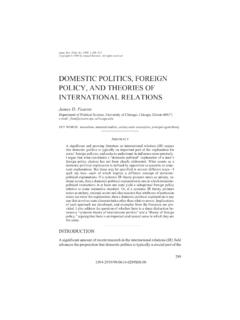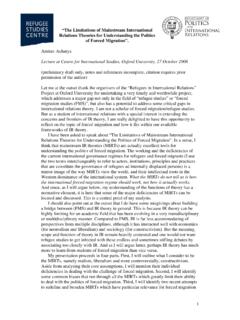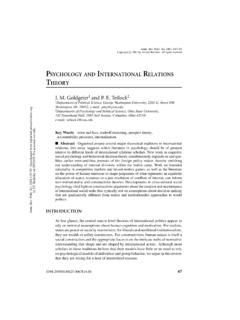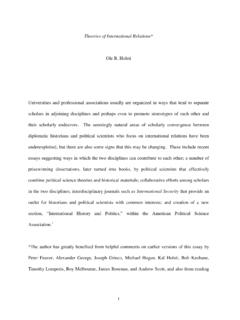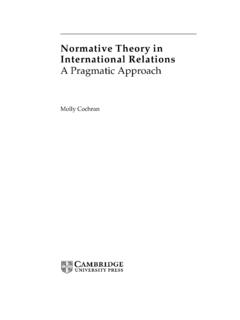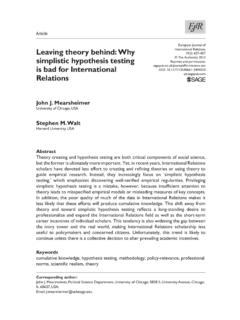Transcription of THEORIES OF WAR AND PEACE - Rutgers University
1 1 THEORIES OF WAR AND PEACE Political Science 522 Jack S. Levy Rutgers University Spring 2015 Hickman 304 732/932-1073 office Office Hours: Tuesday 1:30-2:50pm & by appointment "War is a matter of vital importance to the State; the province of life or death; the road to survival or ruin. It is mandatory that it be thoroughly studied." Sun Tzu, The Art of War In this seminar we undertake a comprehensive review of the literature on the causes of war and the conditions of PEACE , with a primary focus on interstate war.
2 We focus primarily on theory and empirical research in political science but give some attention to work in other disciplines. We examine the leading THEORIES , their key concepts and causal variables, the causal paths leading to war or to PEACE , and the conditions under which various outcomes are most likely to occur. We also give some attention to the degree of empirical support for various THEORIES and hypotheses, and we look at some of the major empirical research programs on the origins and expansion of war. Our survey includes research utilizing qualitative methods, large-N quantitative methods, formal modeling, and experimental approaches.
3 We also give considerable attention to methodological questions relating to epistemology and research design. Our primary focus, however, is on the logical coherence and analytic limitations of the THEORIES and the kinds of research designs that might be useful in testing them. The seminar is designed primarily for graduate students who want to understand (and hopefully contribute to) the theoretical and empirical literature in political science on war, PEACE , and security. Students with different interests and students from other departments can also benefit from the seminar and are also welcome.
4 Ideally, members of the seminar will have some familiarity with basic issues in international relations theory, philosophy of science, research design, and statistical methods. I recognize, however, that students will bring rather diverse backgrounds to the seminar, and consequently I have tried to organize the course in a way that will be useful for students with different types of preparation and different career objectives, including the many students who have international relations as a minor field of study. I have tried to combine breadth of coverage of the "mainstream" scholarship in the field with flexibility for students to advance their own programs of study.
5 For this reason I have coupled a common set of readings for all participants in the seminar with considerable freedom for individual students to select specific topics for their seminar presentations and papers. The required readings are rather extensive, though I assume that you have already read some of these in your other courses. If so, there is no need to read them carefully again, although a brief skim would generally be appropriate. Admittedly, the burden will be somewhat greater for first-year students and non-IR majors. 2 The question of war and PEACE is a broad one, as one might expect for a topic that has engaged scholars from many disciplines since the times of Sun Tzu and Thucydides.
6 Some narrowing of focus is necessary for any one-semester course, and I want to be explicit about which topics and approaches I emphasize and those which get less emphasis. We give little attention to the abstract philosophical question of why is there war? that is, to the question of explaining the constant recurrence of war, the persistent pattern of violent conflict through the ages. Nor do we give much attention to the causes of individual wars. Instead, following most of the social science literature on war, we focus on THEORIES that attempt to explain variations in war and PEACE over time and space.
7 Are wars more likely to occur under some conditions than others, at some times rather than others, between some states rather than other states? Under what conditions are wars likely to escalate or expand, and when are they likely to end? As the late Stuart Bremer asked, Who Fights Whom, Where, When, and Why? Our primary but not exclusive focus in this seminar is on THEORIES of interstate war, which have dominated the international relations literature on international conflict until fairly recently. True, the focus of war studies in the international relations field has shifted significantly in the last decade in response to the shift in the nature of war away from interstate war and towards civil war, insurgency, terrorism, and various forms of communal violence.
8 The study of intrastate war, which was formerly located primarily in Comparative Politics and which was primarily descriptive in orientation, is now part of the broad mainstream of the PEACE /war/security subfield, and cuts across traditional boundaries between the fields of Comparative and international Politics. Despite these trends in the real and academic worlds, we focus on interstate wars for both practical and intellectual reasons. Professor Licklider regularly teaches a course on civil war, and a division of labor seems like the optimum way to cover the vast material on war.
9 In addition, many important theoretical developments, including those overlapping with major debates in international relations theory, have traditionally focused on the origins and escalation of interstate war, so that a familiarity with this literature is quite valuable for students preparing for comprehensive exams. Plus, although civil wars and insurgencies are likely to be the most frequent forms of warfare for years to come, interstate wars have the potential to be much more consequential in terms of its human and economic destructiveness and its impact on the structure, stability, and evolution of regional systems and of the international system as a whole.
10 Moreover, there are enough hot spots in the world to make the risk of interstate war a serious concern: conflicts between Israel and Iran over the Iranian nuclear program, Israel and Arab states over the Palestinian issue, India and Pakistan, North Korea and South Korea, and, perhaps in the longer term, between the United States and China. In our treatment of interstate war, we will not give much attention to the strategy or conduct of war, except to the extent that these considerations influence the outbreak, escalation, or termination of war. Following most of the mainstream literature, we also focus more on the causes of war than the consequences of war, though in recent years there is a growing body of literature on the impact of war on the political, economic, and social structures of state and society.


